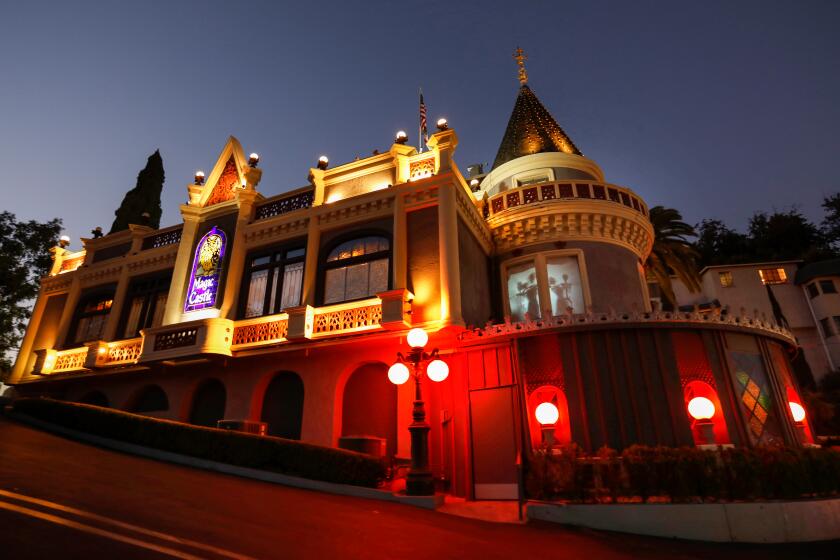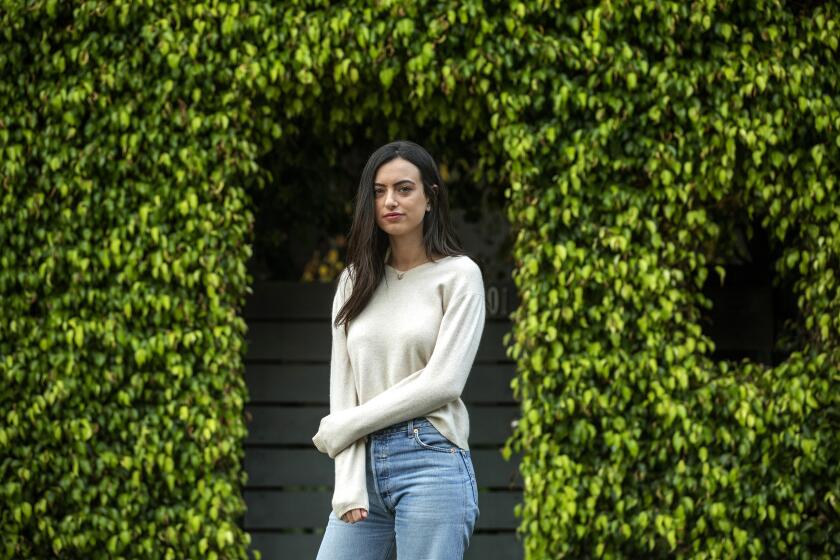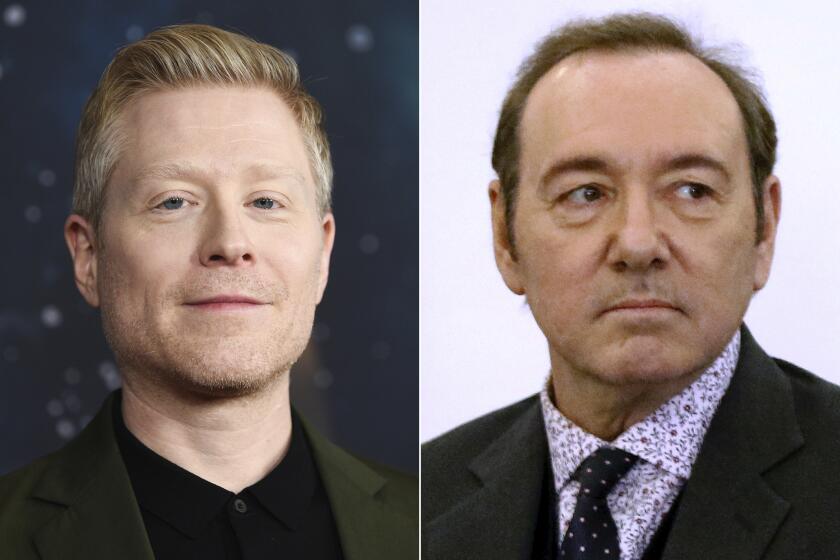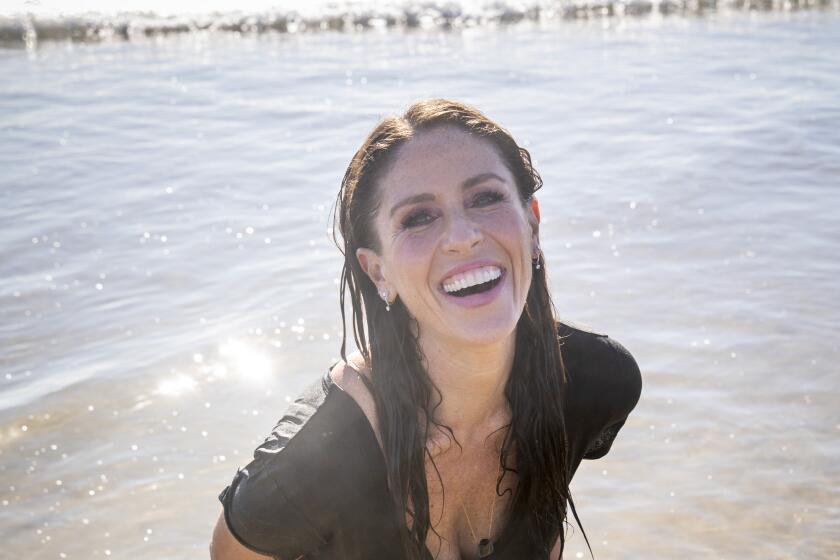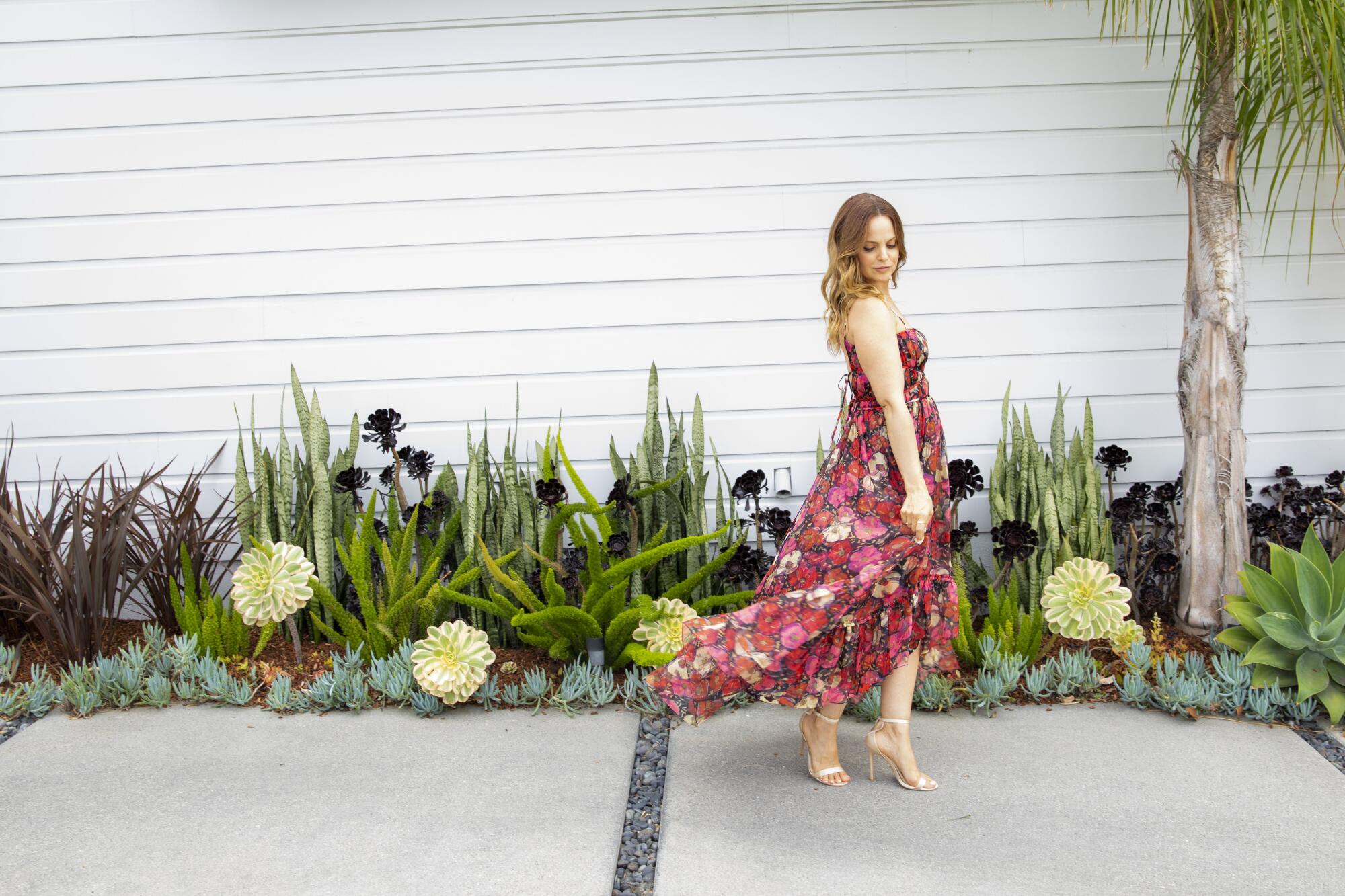
- Share via
There are so many things Mena Suvari never wanted you to know. And there were ghosts of her past all over this town, willing to keep her secrets. Like the woman she ran into once at Whole Foods — a woman with whom she’d had a threesome.
“I was mortified, because I was famous then, and she knew me when I wasn’t,” recalls Suvari, one of the most popular young actresses around the turn of the millennium. “I never wanted to be that person to her. Our paths crossing again was uncomfortable and weird, and I found myself in a situation where I had to apologize.”
It wasn’t that she felt bad about sleeping with women, or doing it freely. It was that she’d spent so much of her life sacrificing her own desires to please men. In one particularly toxic relationship, a boyfriend had pushed her to solicit women — including this one now at the grocery store — to participate in a porn-inspired ménage à trois featuring painful sex toys.
That sort of behavior didn’t jibe with the actress’ public image. In the two 1999 movies that made her famous — the teen comedy “American Pie” and the suburban drama “American Beauty” — the central narrative revolved around her characters’ virginity. She was meant to exude sensuality but practice purity, a common theme for female stars of that generation, including Jessica Simpson, Natalie Portman and Reese Witherspoon.
But it’s been two decades, and Suvari, now 42, says she is tired of pretending. So she’s written a memoir, “The Great Peace,” that will not only shatter her saccharine reputation but also, she hopes, free her from shame.
The book is a relic of Hollywood’s pre-#MeToo era, documenting the ways in which Suvari says she “looked like a Fabergé egg on the outside but was hollow inside.” Beginning to model at age 13, she grew to believe her looks were primarily what she had to offer. She now thinks she confused that kind of attention for love.
In interviews with The Times, 12 people accused Magic Castle management, performers and others of abuses, as the legendary Hollywood club dedicated to the craft of magical performance wrestles with allegations and membership unrest.
“I took the easy path and bought into the image the magazines, TV shows, and paparazzi had created for me,” she writes in the book. “I was exceptional, a star, special — too special, in fact, to have problems.”
She tells a story that is harrowing from the outset: At age 12, she writes, she was raped by her brother’s friend. After she moved to L.A. as a teenager, a photographer took — and kept, she alleges — naked underage snapshots of her. She writes that when she was 16, one of her representatives — 20 years her senior — would have sex with her and then remind her to learn her lines or brush her hair before an audition. She contracted herpes, she says.
She got married and divorced twice — first, when she was 21, to Robert Brinkmann, a 37-year old cinematographer she met during a movie shoot. Ten years later, she married Simone Sestito, an Italian concert promoter who, she claims, bled her financially and got physical with her during heated arguments. (In a statement, Sestito denied Suvari’s allegations: “It’s very sad and disheartening that Mena would have to make up lies about me to try and sell her story; it’s a disservice both to herself and real victims of abuse.”)
Suvari says she numbed her problems with marijuana and, at one point, meth. She grew critical of her body, getting breast implants only to have them surgically removed years later because they embarrassed her.

Suvari is actually topless when she greets me, inviting me to sit on the bed where she is attempting to breastfeed her 4-month old son, Christopher.
“Oh, you’re gonna take over the interview now,” she says, trying to soothe her firstborn as he starts crying. “He’s an Aries. Full of fire.”
For someone who divulged so much on the page, Suvari in person is guarded. Although she has let many people into her physical private space today — this reporter, a publicist, a stylist, a makeup artist, a photographer and a nanny — she does not open up quickly. She chooses her words carefully and speaks in a measured tone, a calmness reflected in the earth tones decorating her home.
Her third husband, Mike Hope — a set decorator and prop master she met five years ago — is hanging around too. When he hears their son crying, he comes into the bedroom to retrieve the child and hand his wife a grain bowl.
It was in 2018, when she was redecorating her home with Hope, that Suvari made a discovery that would lead to “The Great Peace.” While sifting through an old storage unit, she stumbled across some artifacts from her adolescence, including a 50-page poetry binder, old photographs and a diary containing a suicide note she didn’t remember writing.
She knew she needed to do something with the material but wasn’t sure what. She felt as if every actress had a perfume and a book and thought she should do something “more creative.” But after Suvari toyed with various ideas — telling her story fictionally in the third person, publishing a poetry collection — she was persuaded by a friend to go the memoir route.
Out with the essay collection ‘No One Asked For This,’ David talks candidly about nepotism, Pete Davidson and a terrifying, hilarious web of neuroses.
“Even that first draft was better than ones I get from people who write for a living,” says Ben Schafer, her editor at Hachette. “And I didn’t feel like I had to censor or hold back in order to not hurt her.”
He adds: “I think she goes into places in this book that some people might not even talk about with their closest friends, or even with themselves.”
All-American girl
In “American Pie,” Suvari was cast as a guileless choir girl who dates the football jock with a heart of gold. Shortly after the film was released, she and her costar Chris Klein were featured on the cover of Vanity Fair alongside fellow all-American youths such as Paul Walker, Selma Blair and Jordana Brewster.
“I had to figure out what people wanted from me, and with ‘American Pie,’ I could play into that image,” says Suvari, who was living with that threesome-obsessed boyfriend at the time, sleeping on a mattress on the floor of his apartment. “I couldn’t say, ‘My life is a nightmare right now,’ because they wanted to hear what my experience was like in high school when I went to prom.”
She got better at faking it only after she landed the role in Sam Mendes’ “American Beauty.” Suvari was to play Angela, an alluring high school cheerleader whose best friend’s father, Lester (Kevin Spacey), develops a strong attraction to her. Lester’s fantasy of the girl — featuring Suvari splayed out nude in a bed of red rose petals — became one of the most enduring images from the movie.
“Everybody could talk about how iconic that was, but I didn’t feel beautiful,” remembers Suvari. “The roses were beautiful, and they offered to let me take as many home as I wanted. But I was never like, ‘I’m her. I made it.’ I didn’t know how to match those identities up.”
Thora Birch, who starred as Angela’s BFF, says that in rehearsals for the movie, the actors discussed their personal connections to their characters. During those sessions, Birch got the sense that Suvari “had been through some things and had a difficult upbringing,” but she had no idea of “the extent” of it until reading her book.
“It was like she was leading a double life,” says Birch, who was 16 at the time. “She developed a personality that seemed open and accessible, but if you thought about it, you realized you didn’t know too much about her. She was guarded. We were both in a place where our external selves in no way matched our internal world, and I think we could both feel trapped by that.”
Suvari also recalls what she describes as an “odd” encounter with Spacey on the set of the Oscar-winning picture. Before the two actors were set to film an intimate scene between Angela and Lester, “Kevin took me into a small room with a bed and we laid next to each other, me facing toward him while he held me lightly,” she writes.
“Lying there with Kevin was strange and eerie but also calm and peaceful, and as for his gentle caresses, I was so used to being open and eager for affection that it felt good to just be touched. Good and warm. I wasn’t sure if Kevin was interested in me or not. My head immediately went to that place, and I didn’t know how far he was going to take it or how I was going to react if he did go there. But he didn’t.”
Anthony Rapp is one of two men who filed a new lawsuit against actor Kevin Spacey, accusing him of sexual assaults in the ‘80s when they were teens.
Asked if she now views the encounter differently in light of the numerous men who have since come forward claiming Spacey sexually assaulted them, Suvari grows defensive.
“No. What do you mean?” she asks. “I talked about my time on the set of ‘American Beauty,’ so that was just part of my experience. It’s something that I feel so grateful to be a part of, and truly it was feeling lucky to have a job. I felt so connected, like I understood this character of Angela. To have the ability to step outside and be in that space really saved me.”
Birch says she also asked Suvari about the passage and “didn’t get the sense that she was creeped out. I don’t think it was a creepy dude thing.” While the two actresses didn’t bond during the filming, Birch says they’re now “text buddies” who have grown closer over the last few years.
“I walked away from her book thinking it was a very, very timely memoir in this larger discussion of female strength and finding your voice,” Birch says. “She’s overcome so much and come out on the other end in the best possible place.”
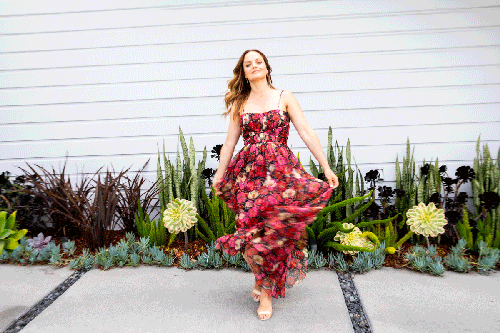
Suvari, who lives a few blocks from the beach, is still very much a working actress, appearing in everything from “American Horror Story” to Lifetime movies to an upcoming biopic where she’ll play Ronald Reagan’s first wife, Jane Wyman. Opening up about her past has allowed her to feel “more present” in her acting, she says, no longer “severely uncomfortable” at auditions or meetings.
“I have spent so much of my life feeling in the boat alone,” she says. “There were many moments where I felt like I had nowhere to go, like no one would understand. I was too embarrassed, so I stayed in bad situations. I’m sharing my story to help people like that know they don’t have to stay. If I can shave off a summer of suffering for someone, I want to.”
When the ‘Punky Brewster’ star embarked on a new documentary, she found that confronting her past, including surviving sexual assault, was the only way forward.
More to Read
Sign up for our Book Club newsletter
Get the latest news, events and more from the Los Angeles Times Book Club, and help us get L.A. reading and talking.
You may occasionally receive promotional content from the Los Angeles Times.

